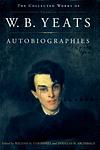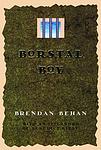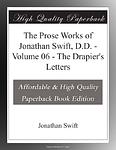The Greatest Bulgarian, Roman, Irish "Nonfiction" Books of All Time
Click to learn how this list is calculated.
This list represents a comprehensive and trusted collection of the greatest books. Developed through a specialized algorithm, it brings together 305 'best of' book lists to form a definitive guide to the world's most acclaimed books. For those interested in how these books are chosen, additional details can be found on the rankings page.
Genres
Countries
Date Range
Reading Statistics
Click the button below to see how many of these books you've read!
Download
If you're interested in downloading this list as a CSV file for use in a spreadsheet application, you can easily do so by clicking the button below. Please note that to ensure a manageable file size and faster download, the CSV will include details for only the first 500 books.
Download-
1. Confessions by Augustine
"Confessions" is an autobiographical work by a renowned theologian, in which he outlines his sinful youth and his conversion to Christianity. It is written in the form of a long, introspective prayer directed to God, exploring the author's spiritual journey and deep philosophical ponderings. The book is renowned for its eloquent and deeply personal exploration of faith, making it a cornerstone of Christian theology and Western literature.
The 148th Greatest Book of All Time -
2. Meditations by Marcus Aurelius
"Meditations" is a collection of personal writings by a Roman Emperor, providing deep insights into Stoic philosophy. The book is a series of introspective reflections on how to deal with life's challenges with wisdom, integrity, self-discipline, and benevolent affection for all mankind. It serves as a manual for self-improvement and moral guidance, emphasizing the importance of accepting things outside of one's control and maintaining a tranquil mind amidst adversity.
The 390th Greatest Book of All Time -
3. De Rerum Natura by Lucretius
"De Rerum Natura" is a long didactic poem written in the first century BC, which explores Epicurean philosophy and the nature of the universe. The text delves into topics such as the nature of the gods, the atomic structure of the universe, human sensation and thought, and the fear of death. The author argues that understanding the physical world can free humans from superstition and fear, leading to peace of mind and true happiness.
The 491st Greatest Book of All Time -
4. Annals by Cornelius Tacitus
"Annals" is a historical work that provides a comprehensive account of the Roman Empire from the reign of Tiberius in 14 AD to the death of Nero in 68 AD. The author, a senator and historian of the Roman Empire, explores the inner workings of Roman politics, military campaigns, and social culture during this period. The book offers an in-depth look at the political machinations, power struggles, and the moral decay of the Roman elite, providing a critical perspective on the Roman emperors and their rule.
The 901st Greatest Book of All Time -
5. Kafka's Other Trial by Elias Canetti
This book is a detailed examination and interpretation of the correspondence between a renowned author and his fiancée, Felice Bauer. The author uses these letters to analyze the writer's psyche, his relationships, and his work. The book provides a unique insight into the author's life and the influence of his engagement on his writing, particularly his novel "The Trial". The author's struggle between his commitment to writing and his relationship with Felice forms the central theme of the book.
The 1258th Greatest Book of All Time -
6. Lives of the Caesars by Suetonius
"Lives of the Caesars" is a historical narrative that provides a detailed account of the personal and public lives of the first twelve Roman emperors, from Julius Caesar to Domitian. The author presents a vivid depiction of their character, behavior, appearance, and private lives, as well as their political actions, military exploits, and administrative policies. The book is a valuable source of information about the Roman Empire's early days, offering a unique perspective on the power, corruption, and extravagance of the Roman elite.
The 1325th Greatest Book of All Time -
7. Autobiographies by William Butler Yeats
This book is a collection of autobiographical essays by a renowned Irish poet and playwright, reflecting on his personal and professional life. It provides a deep insight into his early life, family, influences, and the evolution of his poetic and dramatic works. The author also gives a vivid account of the Irish literary scene and the cultural and political climate of his time, including his involvement in the Irish National Theatre and the Irish Literary Society.
The 1380th Greatest Book of All Time -
8. The City of God by Augustine
The book is a philosophical and theological masterpiece, written as a defense of Christianity after the sack of Rome in 410 AD. The author contrasts the earthly city, characterized by pride and love of self to the point of contempt for God, with the heavenly city, characterized by love of God to the point of contempt for self. He argues that though the earthly city may seem dominant in the present age, the heavenly city will ultimately triumph. The book is a profound exploration of history, philosophy, religion, and the human condition.
The 1643rd Greatest Book of All Time -
9. Letters from a Stoic by Seneca
"Letters from a Stoic" is a collection of moral epistles written by a renowned Stoic philosopher. The letters provide practical guidance on everything from dealing with adversity and the pursuit of wisdom to the folly of consumerism and the nature of friendship. The author's stoic philosophy encourages peace of mind through understanding and accepting the natural order of the universe, and his letters offer timeless wisdom and insights that are still relevant today.
The 1703rd Greatest Book of All Time -
10. Histories by Cornelius Tacitus
"Histories" is a comprehensive account of the Roman Empire from 69-96 AD, a period marked by significant political turmoil. It provides an in-depth look at the reigns of four emperors: Galba, Otho, Vitellius, and Vespasian, along with the social and political upheavals of the time. The narrative also covers the Jewish rebellion and the burning of the Jerusalem Temple, offering a rich historical context of the period. Despite some gaps in the record, it remains a crucial primary source for understanding this era of Roman history.
The 1803rd Greatest Book of All Time -
11. Germania by Cornelius Tacitus
"Germania" is a historical and ethnographic work that provides a detailed description of the lands, customs, and tribes of the Germanic people in the first century AD. The author, a Roman historian and senator, offers a comprehensive account of the geography, anthropology, social institutions, and military practices of the Germanic tribes, often comparing their culture and values to those of the Romans. The work is considered a valuable source of information about the ancient Germanic tribes, despite its possible biases and inaccuracies.
The 2333rd Greatest Book of All Time -
12. Titi Livi Ab urbe condita libri by Livy
This historical work offers a comprehensive narrative of the history of Rome, from its mythical origins to the reign of the Roman Emperor Augustus. The author chronicles the major political, military, and social events of the Roman Republic, including the founding of the city, the establishment of the Republic, the Punic Wars, and the rise of Julius Caesar. The book is a significant source of information about the early history of Rome and is often considered one of the most important works of Roman history.
The 2400th Greatest Book of All Time -
13. Borstal Boy by Brendan Behan
"Borstal Boy" is a semi-autobiographical novel that depicts the author's experiences in a British juvenile detention center, or borstal, during World War II. The young protagonist is arrested in Liverpool for his involvement with the Irish Republican Army and is sent to borstal where he spends his formative years. The narrative explores themes of patriotism, identity, and the complexities of adolescence, presenting a raw and compelling portrayal of life in detention and the relationships formed there.
The 2443rd Greatest Book of All Time -
14. Poetry by Quintus Lutatius Catulus
This book is a collection of ancient Roman poetry by a renowned statesman and poet. The poems reflect the author's experiences, thoughts, and feelings about life, love, politics, and society during the Roman Republic era. The author's eloquent and vivid writing style, combined with his astute observations and insights, make this book a valuable resource for understanding Roman culture and history.
The 2844th Greatest Book of All Time -
15. The Voices of Marrakesh: A Record of a Visit by Elias Canetti
This book is a travelogue that captures the author's experiences and observations during a visit to Marrakesh, Morocco. The author vividly portrays the city's vibrant culture, bustling markets, and unique characters, giving readers a glimpse into the everyday life of Marrakesh. The book also explores deeper themes such as the clash between tradition and modernity, and the power dynamics between the city's various social classes.
The 2942nd Greatest Book of All Time -
16. Catiline Orations by Marcus Tullius Cicero
"Catiline Orations" is a series of speeches given by a renowned Roman statesman, which were aimed at exposing and condemning the conspiracy led by Lucius Sergius Catilina. The speeches, delivered in the Roman Senate, are a masterful display of oratory skills and political acumen, as the statesman successfully manages to turn the Senate against Catiline, ultimately leading to his downfall. The book offers an in-depth study of these speeches, providing valuable insights into Roman politics, rhetoric, and the art of persuasion.
The 3093rd Greatest Book of All Time -
17. Natural History by Pliny (the Elder)
"Natural History" is an extensive work of literature that provides a comprehensive look at the knowledge of the natural world during the Roman era. The book is divided into 37 volumes, each focusing on different aspects such as geography, anthropology, zoology, botany, and mineralogy. The author's curiosity and fascination with the world are evident in his detailed observations and descriptions. The book also includes discussions on art, sculpture, and various other topics, providing a rich and detailed snapshot of the Roman understanding of the world.
The 3202nd Greatest Book of All Time -
18. Extracts From Notes On The Bulgarian Uprisings by Zahari Stoyanov
The book is a seminal historical account that provides a detailed chronicle of the Bulgarian uprisings against Ottoman rule in the 19th century. Through a compilation of personal observations, interviews, and documents, the narrative vividly portrays the struggles, sacrifices, and heroism of the Bulgarian revolutionaries. It serves as both a tribute to the national liberation movement and a meticulous record of the events leading up to the eventual liberation of Bulgaria, offering an invaluable perspective on the country's fight for independence and the broader context of Balkan history during this tumultuous period.
The 3250th Greatest Book of All Time -
19. A Treatise Concerning the Principles of Human Knowledge by George Berkeley
This philosophical work challenges the idea of materialism, arguing that objects only exist as a perception of the mind. The author asserts that we can only directly know sensations and ideas of objects, not the objects themselves. He also discusses the role of God, suggesting that our perceptions are dependent on the will of a higher power. The text is a significant contribution to the field of metaphysics and epistemology, offering a unique perspective on the nature of human knowledge and perception.
The 3400th Greatest Book of All Time -
20. The Consolation of Philosophy by Boethius
"The Consolation of Philosophy" is a philosophical work written in the 6th century, where the author, imprisoned and awaiting execution, engages in a series of dialogues with Lady Philosophy about the nature of life and human happiness. The author grapples with the harsh realities of his own life, including his fall from favor, his unjust imprisonment, and impending execution. Through these dialogues, the author learns to understand life from a philosophical and spiritual perspective, finding consolation and peace amidst his dire circumstances. The work is a profound meditation on fate, free will, time, and eternity.
The 3462nd Greatest Book of All Time -
21. On The Ends Of Good And Evil by Marcus Tullius Cicero
"On the Ends of Good and Evil" is a philosophical work that explores the ethical theories of Hellenistic schools, including Stoicism, Epicureanism, and the Peripatetic tradition. Through a series of dialogues, the text delves into the nature of happiness and the ultimate end of human action, examining what constitutes the highest good. The author critiques and compares the doctrines of these schools, ultimately defending the Stoic view that virtue is the sole basis of happiness and the ultimate goal in life, while also acknowledging valuable insights from other philosophical traditions.
The 4688th Greatest Book of All Time -
22. Selected Stories by William Trevor
"Selected Stories" is a collection of short stories by acclaimed author William Trevor. The book features some of Trevor's most memorable and haunting tales, exploring themes of love, loss, and the complexities of human relationships. With his signature style of understated elegance and quiet, observant prose, Trevor creates characters that are both ordinary and extraordinary, capturing the subtle nuances of their lives and the emotions that drive them. From the Irish countryside to London's bustling streets, these stories offer a glimpse into the human experience and the ways in which we navigate the world around us.
The 5817th Greatest Book of All Time -
23. Catiline's War, The Jugurthine War, Histories by Sallust
This book is a combination of three works by a Roman historian and politician, focusing on the political and military events of the late Roman Republic. It first covers the conspiracy led by Catiline in 63 BC, then shifts to the war against Jugurtha in North Africa, and finally provides a fragmentary history of Rome from 78-67 BC. The author uses these events to critique the moral decay of Rome, highlighting the corruption, greed, and ambition that he believed led to the fall of the Republic.
The 6513th Greatest Book of All Time -
24. We Don’t Know Ourselves by Fintan O'Toole
"We Don't Know Ourselves" by Fintan O'Toole is a collection of essays that explores the current state of Ireland and its people. O'Toole argues that Ireland's sense of identity has been shaped by its history of colonization and the struggle for independence, but that this identity is now being challenged by globalization and the changing social and economic landscape. He examines issues such as immigration, the Catholic Church's declining influence, and the rise of nationalism, and ultimately argues that Ireland needs to embrace a new sense of identity that is inclusive and forward-thinking.
The 7090th Greatest Book of All Time -
25. The Prose Works Of Jonathan Swift by Jonathan Swift
This collection of writings by a prominent 18th-century satirist and essayist offers a diverse range of his non-poetic works, including political pamphlets, essays, and correspondence. The compilation showcases the author's sharp wit, profound disdain for contemporary society and politics, and his exceptional ability to use satire as a means of social commentary. Through his prose, the author addresses issues such as the corruption of the British government, the oppression of Ireland, and the follies of human nature, all while displaying his mastery of language and rhetorical skill. This body of work not only provides insight into the author's mind but also reflects the complexities and concerns of the Enlightenment period.
The 7168th Greatest Book of All Time
Reading Statistics
Click the button below to see how many of these books you've read!
Download
If you're interested in downloading this list as a CSV file for use in a spreadsheet application, you can easily do so by clicking the button below. Please note that to ensure a manageable file size and faster download, the CSV will include details for only the first 500 books.
Download





















